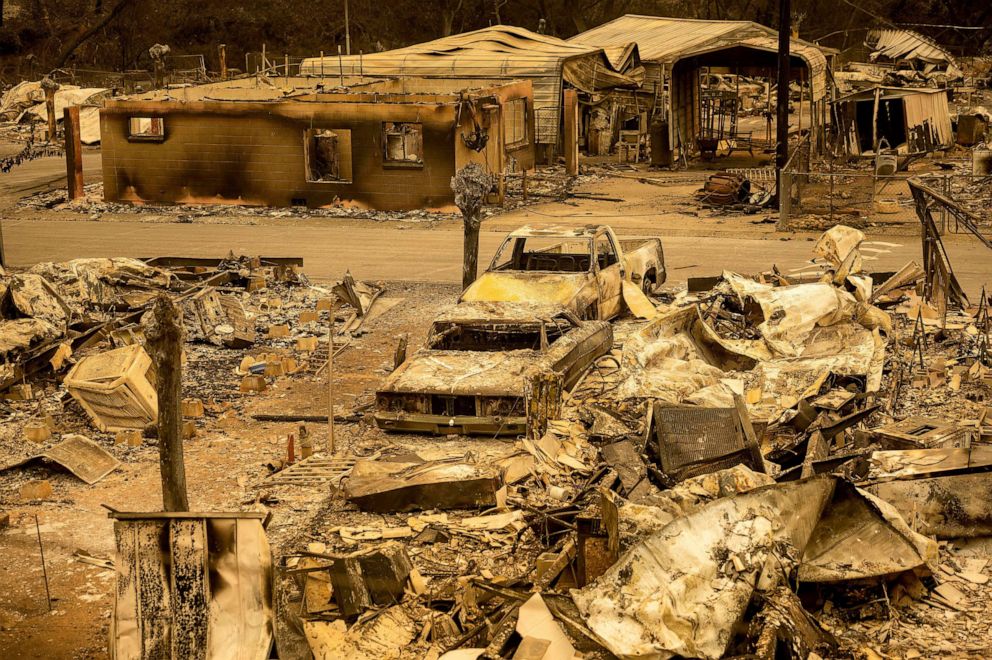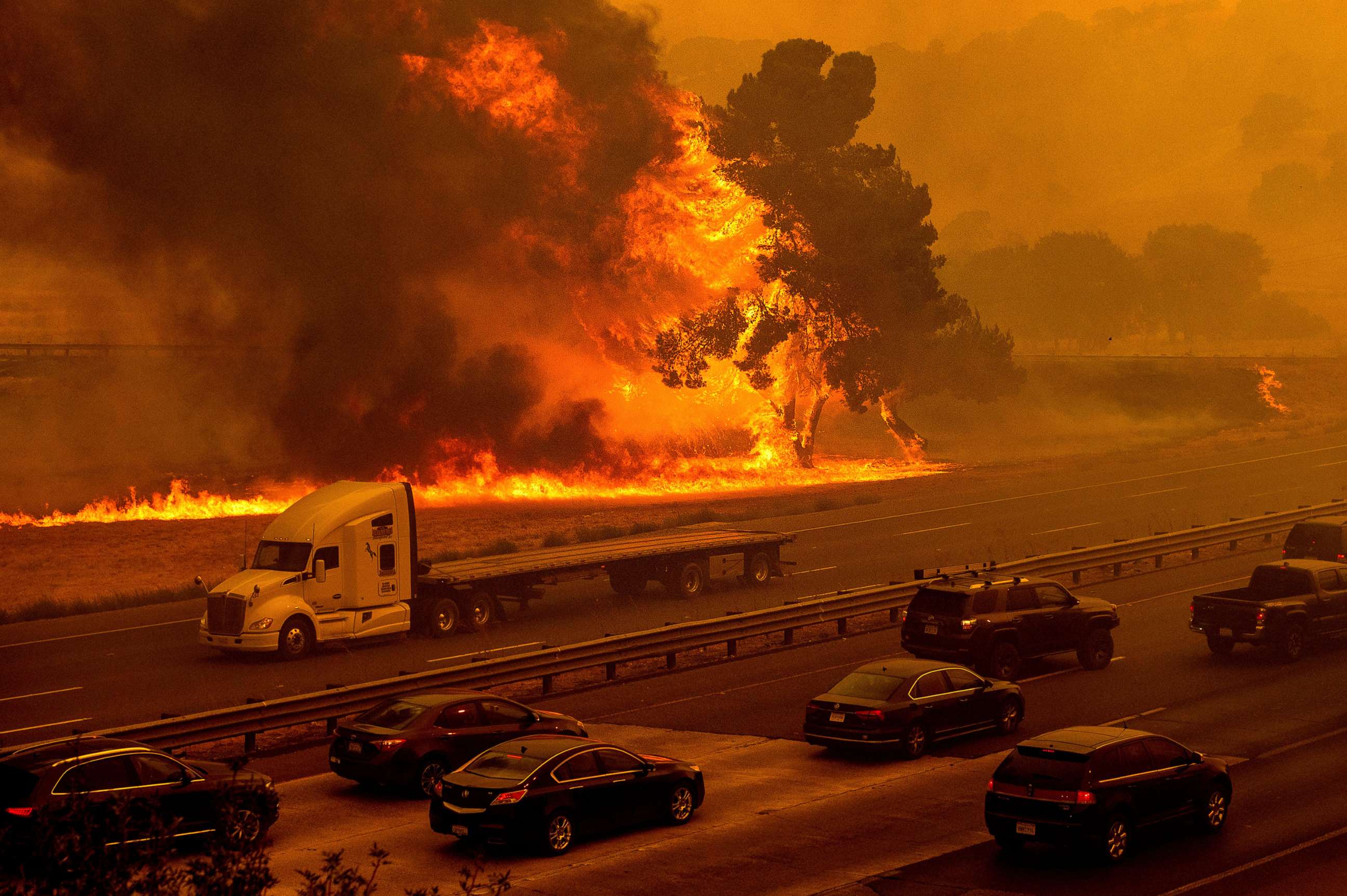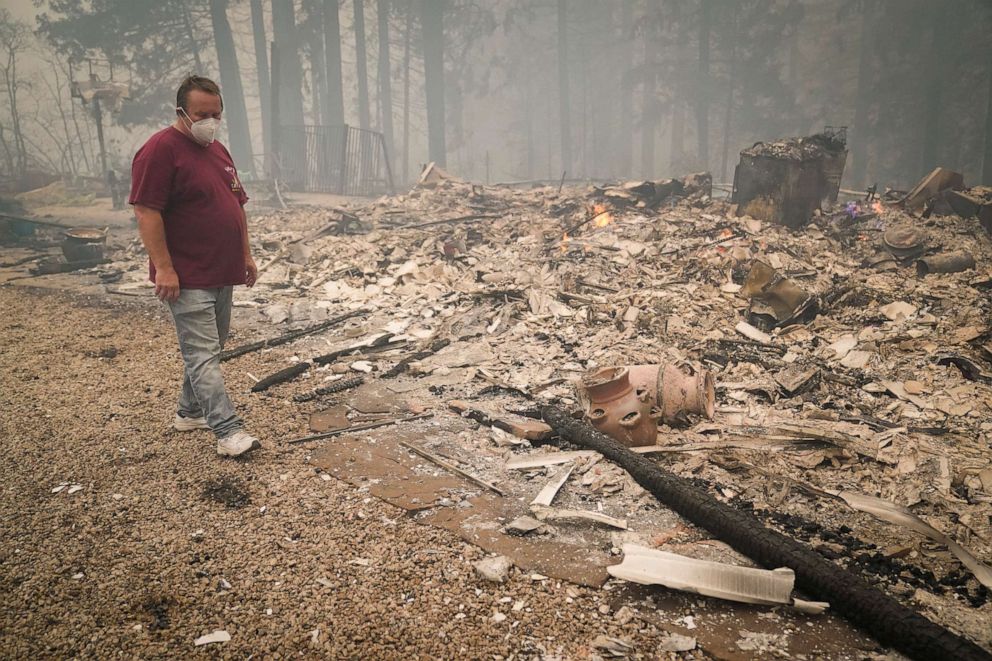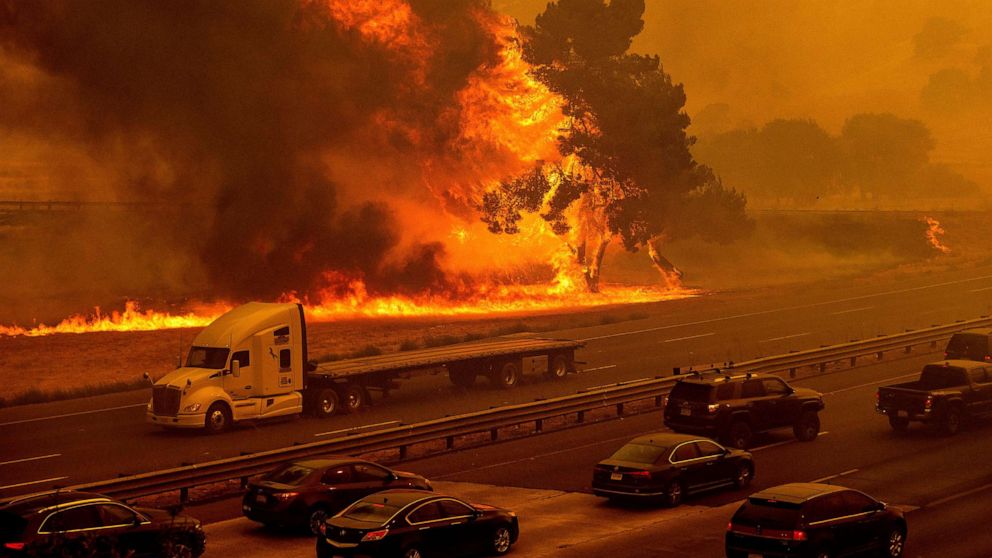California fires stretch resources as evacuation orders grow
Widespread fires continue to burn across California, stretching resources and expanding evacuation orders that have forced thousands to leave their homes.
A historic lightning siege in the state has ignited hundreds of fires since Monday, and as some are contained, others newly emerge or merge. The fires have also come during a record-breaking heat wave in California.
Some of the largest wildfires are in Northern California.
The biggest incident -- the so-called SCU Lightning Complex fires -- has burned more than 137,400 acres across Santa Clara, Alameda, Stanislaus, Contra Costa and San Joaquin counties since Tuesday. It was only 5% contained by Thursday afternoon, as more than 1,000 personnel battled over 20 fires. So far two firefighters have been injured, officials said.
The LNU Lightning Complex fires in Napa, Sonoma and Solano counties has been the most destructive, with 105 structures destroyed, 70 damaged and 30,500 threatened. It's also one of the fastest-growing. By Wednesday, it had burned more than 46,000 acres; by Thursday afternoon, that number had ballooned to 131,000 acres, and the fires were still 0% contained. More than 580 personnel were fighting the complex fire, which so far has resulted in four civilian injuries, officials said.

In central California, 48,000 people have been ordered to evacuate due to the CZU August Lightning Complex fires in Santa Cruz and San Mateo counties. It was 0% contained as of Thursday afternoon, burning some 48,000 acres. Nearly 600 firefighters were assigned to the fires, with three reported injuries. Fifty structures have been destroyed so far, with more than 8,500 threatened.
"Those are just the confirmed structures," Cal Fire Chief Deputy Director Craig Tolmie said Thursday evening. "We believe it will go to the triple digits, it's just too early."
The University of California, Santa Cruz campus was also evacuated Thursday night.
The fire complex has "significant growth" potential due to weather patterns and the fire history, Cal Fire incident Cmdr. Billy See said Thursday at a press briefing.
Smaller fires also continue to burn or pop up throughout California, including several in Monterey County.
Six people total have died this week in connection with the fires in the state, including two fighting the wildfires. A utility worker clearing roadways for emergency vehicles responding to the LNU Lightning Complex fires was found unconscious in his car on Wednesday and died at a nearby hospital, officials said. A helicopter pilot involved in firefighting was killed in a crash near Coalinga Wednesday morning, officials said.
Four civilians have died, all announced on Thursday. In Solano County, the sheriff’s office confirmed to ABC News that an adult man was found dead on a road that had been burned, saying "the person succumbed to the fire." Cal Fire said Thursday night three other people had died in Napa County, but no specifics were immediately available.
Due to the sheer number of fires, resources, from personnel to vehicles to air tankers, are stretched, authorities said.
"We're used to lots of resources, and that's not where we're at today," Chief Sean Cavanaugh, a Cal Fire incident commander, said Thursday at an update on the LNU Lightning Complex.
Down in San Mateo and Santa Cruz counties, the situation is the same.
"We have very little firefighting resources," See said. "The emergency response capabilities in California have been pushed to their extent."

One limited resource is people. The LNU Lightning Complex has 587 personnel responding to it. "That's a very low number," Division Chief Jeff Chumbley, a Cal Fire public information officer, told ABC News. For comparison, a recent fire in central California with "significantly less acreage" had about 500 personnel on it, he said.
"I'm sure that every fire is experiencing similar circumstances, as far as just shortage of personnel," he said.
Going into the wildfire season, California was already short on personnel; the Sacramento Bee reported last month that California has had fewer inmate firefighting crews due to quarantine measures and expedited releases amid the coronavirus pandemic.
See said they are bringing in resources from outside the state to help battle the CZU August Lightning Complex, "but that takes time."
As responders start building containment lines in one incident, that should free up resources for others, Chumbley said.
"I think we're all just trying to be as patient as we can as we wait for resources," he said.
In the meantime, evacuation orders have been issued for areas in nearly a dozen counties, and more are expected over the next 48 hours, Cal Fire officials said, as the fires continue to burn mostly uncontained. Santa Cruz County has also asked visitors to leave to make room for evacuees in hotels, which are being used as shelters.

Officials are urging people to comply with the evacuation orders to ease the burden of the responders and prevent injury or death.
"Evacuation areas are dangerous," Sonoma County Sheriff Mark Essick said at a press briefing Thursday. "Once an area is evacuated, we do not want you to reenter that area."
Essick said there were "minor reports" of people needing to be rescued after entering evacuation areas.
"When we have to rescue you from an evacuation area, it creates a secondary burden on police and fire services and adds to the problems," he said.
Authorities are also concerned that people are pulling over on highways to take photos of the fires, which can hinder evacuations.
For those at home, the state health department is urging people near fire-stricken areas to stay indoors when possible due to poor air quality.
"Smoke doesn't know borders or boundaries, and regions that are miles away from fires can have poor air quality," the department's acting director, Sandra Shewry, said in a statement.
ABC News' Jenna Harrison and Matt Fuhrman contributed to this report.




